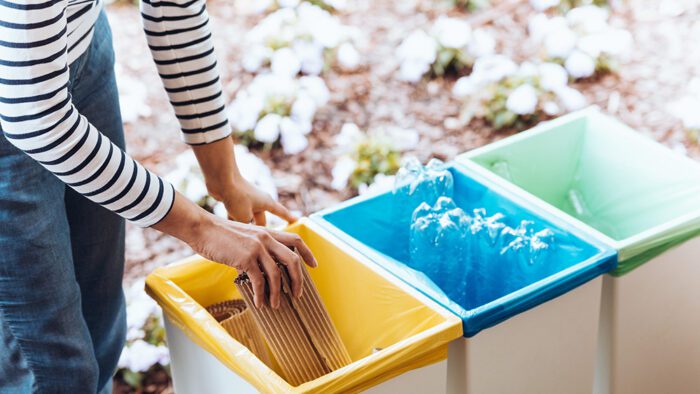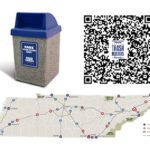
Recycling can help prevent waste from accumulating in local landfills. However, people often recycle items that are not actually recyclable due to their inability to break down, their toxicity levels, or other potential issues. While you may be well-intentioned as a recycler, it is important to understand what trash can be recycled so that we can all do our part to keep Tennessee beautiful. In addition, when you know what trash can be recycled, you are reducing the trash in landfills, helping keep litter off of our roadways and protecting the environment.
Here’s how to identify what trash can be recycled:
Paper and Cardboard Are Great To Recycle
According to the EPA, paper makes up 23% of all solid waste each year. However, in many cases, paper and cardboard can be recycled. Recycled paper can also be made into new paper products, drastically lessening the number of trees cut down each year. Recycling these items helps make paper and cardboard more sustainable overall.
Paper products, including newspapers, magazines, mail, postal boxes and even pizza boxes, are all examples of paper and cardboard that can be recycled. Remember, items like glittery or metallic gift wrap cannot be recycled. However, if your gift wrap is made of 100% paper, it can be put in your recycling bin. Try the scrunch test before you put it in the trash can! Wrapping paper you can crumple up is a good candidate for recycling. If it resists your scrunching, that probably means it needs to go in the trash can instead.
Glass, Metals, Plastic, Batteries and Electronics All Have Special Containers for Recycling
Most glass, including jam jars, drink bottles, dressing containers, and other glass, can be recycled in your normal pick-up. Metals, including aluminum soda cans, soup cans, and foil, can be recycled on your regular recycling day, too. All plastic bottles and containers, including tubs, lids and plastic trays that are marked with a 1 or 2 are accepted. However, you must ensure you thoroughly rinse and wash all glass, metal and plastic before placing it in the recycle bin. When in doubt, check out our handy recycling map! Just locate your area, click on a location and go to their website. You can find out more about what that location accepts, their hours and more!
Batteries and electronics can be recycled carefully. This type of waste is known as e-waste. It is a growing problem as we continue to become technologically dependent. When recycling batteries, it is best to determine what type of battery you have so that you can recycle it correctly. The same is true for laptops, TVs, mobile phones and other electronics you might have. These must be dropped off in specific locations because they can often have toxic substances that can harm the environment if not disposed of properly. Find a collection site near you by visiting the Call2Recycle website.
Don’t Put Food or Liquid in Your Recycling Bin
You may think that because food and beverage containers are recyclable, you can put food or liquid in your recycling bin. That is incorrect! Food and liquid can do more harm than good if you put them out with your other recycles.
To best recycle paper and cardboard food containers, ensure that you rinse or scrape out the food residue left in them.
You can also see if composting might be right for you for food waste. Another easy way to reduce the impact you have on the litter problem is to use multi-use cups and other multi-use food containers, such as glass or metal.
What Items Cannot Be Recycled?
Some items cannot be recycled because they are too costly for waste management. For example, coated paper products, such as address labels, sheets of stickers, potato chip bags and other multi-layer flexible packaging, cannot be recycled and have to go to the landfill.
Items like old tires can become a big part of the litter problem because they must be disposed of in a specific manner. If you need to dispose of tires, find a collection site near you. Use this handy link to discover more about how your county handles waste tires.
Likewise, household products, such as pesticides, paints, used oil and other materials, cannot be recycled. All of these materials need special care when you dispose of them. Tennessee has many household hazardous waste collection events. Click here to find one near you.
Be Proactive About Recycling and Protecting Our Environment
Keep in mind that knowing what trash can be recycled is integral to being proactive and protecting our environment. Throwing items in the recycling bin that cannot be broken down can be costly, lead to contamination and be expensive for the state. If you have trouble determining if something can be recycled or need more information on how something is to be disposed of, check with your local waste management office.
Want to do more to protect our beautiful state? Then check out our event calendar to participate in a litter cleanup near you!
Sources:
- How do I Recycle? Common Recyclables
(United States Environmental Protection Agency (EPA), epa.gov) - How to Recycle and Why You Should Do It
(Student Conservation Association (SCA), thesca.org) - Can You Recycle Your Wrapping Paper? Here’s How to Tell
(KQED, NPR, PBS, kqed.org)



